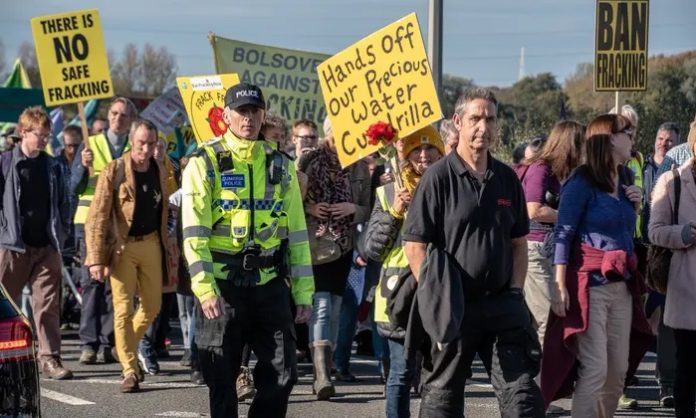On Sunday, coordinated anti-fracking protests in 60 Romanian cities called for a ban on hydraulic fracturing, transparency in decision making, and for the Romanian government to respect the will of local communities. Today’s events followed followed months of protests beginning in Pungesti, a small village near the border with Moldova, but have spread as activists learned that fracking operations are planned or are already underway across Romania.
Over 150 NGO’s cooperated in organizing today’s Ziua Naţională de Proteste anti-fracking, or National Day of Protest Against Fracking, in 60 Romanian cities, and in several cities around the world with significant Romanian populations.
The demands include:
Legal prohibition of hydraulic fracturing in unconventional hydrocarbon exploration and exploitation, including shale gas.
Cancellation government decisions that were illegally approved exploration-exploitation agreements for shale gas development.
Respecting the will of local communities and transparent decision making.
Protesters claim that fracking is illegal in Romania already, because the Petroleum Law (no. 238/2004) does not allow hydraulic fracturing techniques. The deployment of fracking operations in Romania has largely occurred in secret, with lies being told to local populations, and most of the agreements being kept classified because of trade secret concerns.
The Romanian anti-fracking movement began in October in Pungesti. At that time protesters believed the Chevron facility outside Pungesti was the only fracking operation in Romania, and that they could stop all fracking in Romania by stoping this one operation. In December a series of protests were met with a huge crackdown by national Police (Gendarmerie). Private security forces were also present, hired by oil drilling companies to protect work sites. (UPDATED TO CLARIFY ROLES OF NATIONAL POLICE AND PRIVATE SECURITY) Since then, the people of Pungesti have been under travel restrictions severe enough that human rights organizations have cried foul.
At the same time, anti-fracking activists learned of fracking operations elsewhere around Romania, and have been collecting data and evidence. One outgrowth of that effort is the StopFracturare website containing information about fracking risks, environmental impacts, and more.
According to news reports from Romania, 10’s of thousands of people attended rallies across Romania. The attendance in each rally was small, a couple hundred people typically, but with rallies organized in 60 cities the numbers add up. The largest rally was not in Bucharest, where 200 people gathered at University Square, but in Arad where 2,000 people were joined by several political leaders.
“We all go out to the streets, peasants and townspeople, people of different ethnicity’s and beliefs, in the country and in the Diaspora, to defend ourselves with land, water and air. Out in the street to say bluntly that we give and we will defend the right to life, health, future. In Pungesti work Chevron is held under guard Gendarmerie, illegality and dangers of fracturing being ignored to the detriment of the national interest and people’s lives. Join us in the hardest battle that citizens have led the fight for survival in the face of a political class that protects criminal and illegitimate interests persecutes citizens entitled to defend their lives and future,” said Ziua Naţională de Proteste organizers.















